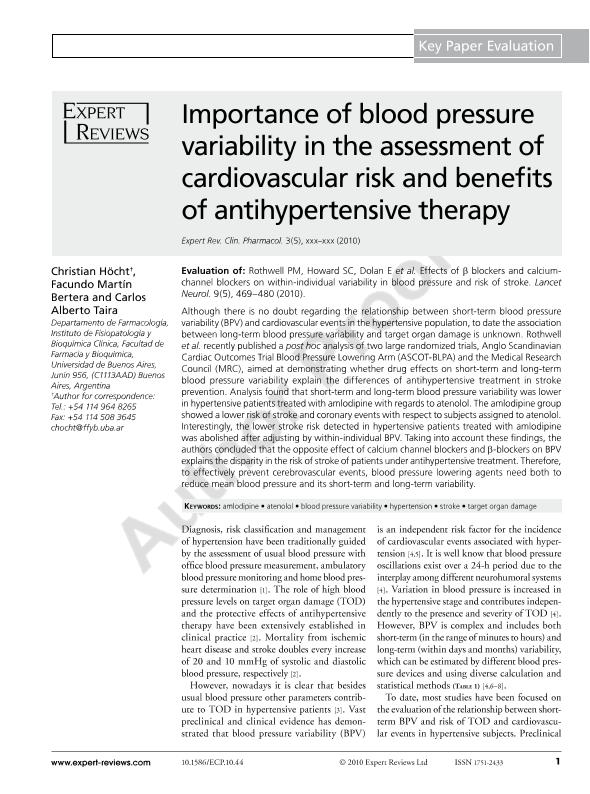Mostrar el registro sencillo del ítem
dc.contributor.author
Höcht, Christian
dc.contributor.author
Bertera, Facundo Martín
dc.contributor.author
Taira, Carlos Alberto

dc.date.available
2017-03-29T20:55:33Z
dc.date.issued
2010-08
dc.identifier.citation
Höcht, Christian; Bertera, Facundo Martín; Taira, Carlos Alberto; Importance of blood pressure variability in the assessment of cardiovascular risk and benefits of antihypertensive therapy; Taylor & Francis; Expert Review of Clinical Pharmacology; 3; 5; 8-2010; 617-621
dc.identifier.issn
1751-2433
dc.identifier.uri
http://hdl.handle.net/11336/14472
dc.description.abstract
Although there is no doubt regarding the relationship between short-term blood pressure variability (BPV) and cardiovascular events in the hypertensive population, to date, the association between long-term BPV and target organ damage is unknown. Rothwell et al. recently published a post-hoc analysis of two large randomized trials, Anglo Scandinavian Cardiac Outcomes Trial Blood Pressure Lowering Arm (ASCOT-BLPA) and the Medical Research Council (MRC), aimed at demonstrating whether drug effects on short-term and long-term BPV explain the differences of antihypertensive treatment in stroke prevention. Analysis found that short-term and long-term BPV was lower in hypertensive patients treated with amlodipine with regards to atenolol. The amlodipine group showed a lower risk of stroke and coronary events with respect to subjects assigned to atenolol. Interestingly, the lower stroke risk detected in hypertensive patients treated with amlodipine was abolished after adjusting by within-individual BPV. Taking into account these findings, the authors concluded that the opposite effect of calcium channel blockers and β-blockers on BPV explains the disparity in the risk of stroke of patients under antihypertensive treatment. Therefore, to effectively prevent cerebrovascular events, blood pressure-lowering agents need both to reduce mean blood pressure and its short-term and long-term variability.
dc.format
application/pdf
dc.language.iso
eng
dc.publisher
Taylor & Francis

dc.rights
info:eu-repo/semantics/openAccess
dc.rights.uri
https://creativecommons.org/licenses/by-nc-sa/2.5/ar/
dc.subject
Amlodipine
dc.subject
Atenolol
dc.subject
Blood Pressure Variability
dc.subject
Hypertension
dc.subject
Stroke
dc.subject
Target Organ Damage
dc.subject.classification
Otras Ciencias de la Salud

dc.subject.classification
Ciencias de la Salud

dc.subject.classification
CIENCIAS MÉDICAS Y DE LA SALUD

dc.title
Importance of blood pressure variability in the assessment of cardiovascular risk and benefits of antihypertensive therapy
dc.type
info:eu-repo/semantics/article
dc.type
info:ar-repo/semantics/artículo
dc.type
info:eu-repo/semantics/publishedVersion
dc.date.updated
2017-03-21T20:12:48Z
dc.journal.volume
3
dc.journal.number
5
dc.journal.pagination
617-621
dc.journal.pais
Reino Unido

dc.journal.ciudad
Londres
dc.description.fil
Fil: Höcht, Christian. Universidad de Buenos Aires. Facultad de Farmacia y Bioquímica. Departamento de Farmacología; Argentina
dc.description.fil
Fil: Bertera, Facundo Martín. Universidad de Buenos Aires. Facultad de Farmacia y Bioquímica. Departamento de Farmacología; Argentina
dc.description.fil
Fil: Taira, Carlos Alberto. Universidad de Buenos Aires. Facultad de Farmacia y Bioquímica. Departamento de Farmacología; Argentina. Consejo Nacional de Investigaciones Científicas y Técnicas; Argentina
dc.journal.title
Expert Review of Clinical Pharmacology
dc.relation.alternativeid
info:eu-repo/semantics/altIdentifier/url/http://www.tandfonline.com/doi/abs/10.1586/ecp.10.44?journalCode=ierj20
dc.relation.alternativeid
info:eu-repo/semantics/altIdentifier/doi/http://dx.doi.org/10.1586/ecp.10.44
Archivos asociados
